Top 3 HVAC Problems in Portland During Spring
After a cold winter, it’s great to finally be able to open windows and let in the fresh air. Spring is also a good time to think about home maintenance, working on improvements, and checking tasks off the to-do List. One thing to consider is the condition of your HVAC system. Spring HVAC problems can be prevented by taking regular care of a system. Common problems Portland AC units experience include:
- Leaks
- Water, debris, and corrosion
- Freezing
- Dirty ducts, filters, fans, and coils
- Worn belts, motors, and moving parts
However, these problems can be avoided with maintenance. AAA Heating and Cooling performs inspections to provide comprehensive evaluations of specific needs, and how to maintain a system. We know how to identify, resolve, and prevent common problems.
1. Corrosion and Moisture in HVAC Systems
Water can corrode wiring and components, and reduce the efficiency and lifespan of a unit. Portland receives a fair share of rain, so it’s important to address the specific needs of a system in this kind of environment. This means taking precautions to protect a system from the elements, such as covering ducts, valves, fans, and openings vents to prevent debris and moisture from entering the system. It can be expensive to address water damage, so it’s important to catch any issues at an early stage, and learn to prevent future problems.
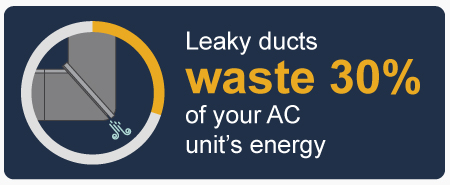
2. HVAC Systems Can Freeze or Leak
Once spring has finally arrived and you turn on the AC for the first time, you may discover it’s not functioning at an optimal level, perhaps as a result of damage that occurred during the winter. Cold temperatures can be problematic to an AC unit because moisture in the system can not only corrode wires, coils, and valves, but also freeze and cause leaks in ducts, valves, and pumps. Refrigerant leaks not only reduce the efficiency of a system, but they can also cause damage to other components. The extra strain decreases AC performance and can be costly.
Signs of damage include:
- Inadequate and uneven cooling
- The unit constantly runs
- High energy costs
3. Not So Fresh Air
Portland showers bring spring flowers – and flowers mean pollen. Pollen is not only a common allergen, but it can also affect the efficiency of an HVAC system. Spring is a good time to check filters for needed cleaning or replacement. With a dirty filter, pollen, dust, and other allergens will be circulated into the air you breathe. Air particles like pollen can clog ducts, affect fans, and cause a unit to work harder. This increases the energy bill and could shorten the lifespan of a system.
Coils are more exposed to the elements and are a more delicate component. They can become dirty and collect debris, reducing the efficiency of the cooling cycle. The coils require the expertise of a trained technician to clean them. If the coils aren’t operating properly, the efficiency and lifespan of the entire AC unit could be impacted.
Don’t get caught sweating in the summer heat by neglecting to do routine AC maintenance in the spring. Schedule an appointment today!
Portland Temperatures Affect HVAC Efficiency
Although the Portland metro area weather is more moderate compared to frigid east coast winters and blazing hot summers in the south, it can dramatically affect the efficiency of HVAC systems. One of the most important factors to take into consideration is the amount of moisture in the air, otherwise known as humidity. Humidity can make the summer air feel even warmer, and the rainy season in the winter makes it feel even colder.
Keeping Warm and Dry
When it’s cold outside furnaces and heat pumps work even harder to compensate for the temperature differences. Even milder winters in Portland cause people to turn the heat up on their thermostat, and fire up the furnace, which is why regular HVAC maintenance is important.
Moisture is an important factor to consider when managing indoor temperatures and maintaining an HVAC system. Water can get into small spaces where it can corrode or freeze, and damage components. Protect systems by covering exhaust and intake pipes, valves, coils, and by removing debris from ducts. Pipes, valves, and coils can freeze or break, causing a furnace to shut down and leave a home without heat in the middle of winter.
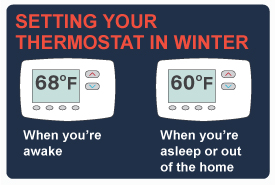 When to Turn Down the Heat
When to Turn Down the Heat
An easy method of maintaining HVAC efficiency is by selecting the best thermostat settings for a specific space. Programmable thermostats can switch between modes on a set schedule, adjusting to the temperature that is most appropriate for the time of day. Turning the temperature down when no one is home saves energy by preventing unnecessary heating and cooling. Thermostats may also have an adjustable cycle, which prevents HVACs from frequently turning on and off to try to stabilize the temperature.
Staying Cool
When the temperatures start to climb, older, less efficient air-conditioning units have trouble cooling inside air. Portland has many older homes, which commonly have less insulation, less efficient ventilation, and older air conditioning units. In these homes it’s more difficult to control the temperature and humidity due to poor circulation. Summers in Portland aren’t the hottest in the nation, but the increase in temperature prompts people to want to cool down and use their AC units, and the humidity makes it feel even warmer.
Humidity doesn’t just make the air feel hotter and heavier, it also interferes with the transition of heat during the cooling cycle, reducing the effectiveness and efficiency of AC units. The air-conditioning cycle involves the circulation of a refrigerant: a fluid that transitions to a gas or vapor that absorbs heat from the desired location and transfers it outdoors. Air conditioners work harder when temperatures climb. This is because the air-conditioning cycle requires the outside temperature to be lower than the heat being released from the unit.
You can reduce the humidity in an area by opening doors and windows to increase air circulation, remove carpeting, which holds moisture and heat, or reduce the number of plants in a space, which increase the amount of moisture in the air.
Our Team is Here to Help
AAA Heating and Cooling can determine the best maintenance for your current system, or what kind of upgrade is best for your home or business by providing seasonal inspections. It’s important to perform routine maintenance and inspections on HVAC systems to ensure it is in proper working condition and prepared for the upcoming season. Don’t let the mild weather in Portland fool you – humidity and temperature fluctuation can affect your HVAC efficiency.
Questions to Ask When Choosing Energy Efficient HVAC Systems
Shopping for an energy efficient HVAC system is a large investment in your home. As building envelopes become tighter and insulation improves the HVAC system that your home required 20 years ago might not fulfill the same needs today. This is especially true if your house received several energy-saving improvements. Asking the right questions about the products you are considering gives you the information that you need to make an educated decision about the best HVAC system for your home, needs, and budget
What to Ask When Shopping for an Energy Efficient HVAC System
What is the SEER number and HSPF rating?
The Seasonal Energy Efficient Ratio (SEER) on a cooling unit tells you how efficient it is. The Heating Season Performance Factor (HFSP) tells you about the efficiency of a heat pump. Systems with an ENERGY STAR label have a SEER of at least 14.5 and an HSPF of at least 8.2 (the higher the number, the greater the efficiency).
What HVAC size do I need?
An energy efficient HVAC will actually waste energy if it is too big or too small. Instead of just using the size of an existing system, a contractor should also take into account additions and energy-saving upgrades that you’ve invested in your home. System size also matters if you plan to add multiple heating and cooling zones in your home.
What is the best type of HVAC unit for my home?
Heating and cooling units are available as natural gas-powered systems, all-electric units, heat pumps, combination systems, ductless mini splits, and radiant heat systems. Review your comfort standards and heating and cooling needs with a licensed HVAC contractor to learn about the advantages and disadvantages regarding the different types of HVAC units available for your home. Find out more about the energy and cost advantages of ductless systems here.
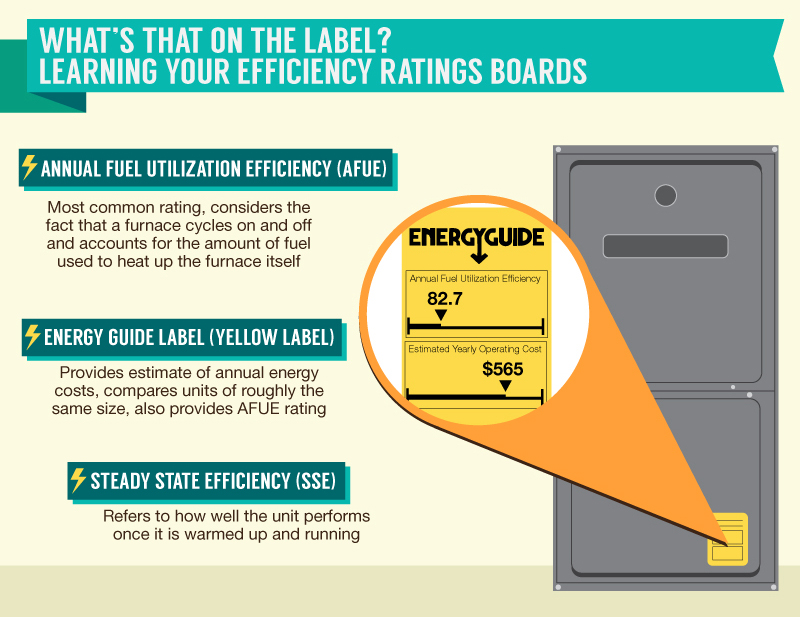
Can you provide me with a free, no-obligation quote?
A good HVAC contractor provides an accurate estimate for an HVAC system, its installation, labor costs, and the options available in writing. This estimate should include the price of parts, energy efficiency-related information and warranty specifications.
What rebates and tax breaks are available for energy-saving HVAC systems?
Investigate local, state, and federal tax laws and energy departments to learn if a system is available for a rebate or tax incentive. In addition, see which manufacturers are offering their own rebates to maximize your savings. A good HVAC contractor will have this information for you.
What are the lifetime operating costs?
When shopping for an HVAC system, look beyond the price and installation costs. Estimate the annual energy costs for your area. Learn how much it costs to maintain the system and if it needs specialized parts that might cost more than others.
What type of air filters does the HVAC unit use?
Some types of HVAC units use specific filters, while others may accommodate different types, such as disposable, washable, or HEPA filters. Learn how often you need to replace or clean the filters, too.
Do I need to replace all of the HVAC equipment?
For an HVAC system to work optimally, it must match the ductwork. Otherwise, you’ll experience energy losses. This could mean finding a heating and cooling system that matches the equipment in your home or replacing the equipment so it matches the system you choose. You may also need a new thermostat.
What does the warranty cover and how long does the coverage last?
Not all warranties are the same. Some offer longer terms and cover different aspects of the HVAC unit. When investigating warranties, also remember to educate yourself on what actions will void them. Curious about ratings? This is what those SEER ratings actually mean.
Does the HVAC unit have moisture control elements?
A home that’s too dry might make you feel uncomfortable, prolong the life of certain viruses, and can cause wood floors and furniture to crack from the lack of moisture. Too much humidity leads to mold and bacterial growth and can make a space feel too stuffy. Moisture control elements in an HVAC unit keep you comfortable and healthy while preventing unnecessary damage to your belongings.
Shopping for an energy efficient HVAC does not have to be confusing or overwhelming. When you work with a reputable contractor like AAA you’ll receive personalized assistance for finding the best energy-efficient products for your home and needs. Contact AAA today to schedule a free consultation. Learn more about our residential services here.
Photo by p.Gordon via CC License
Prolong the Life of Your HVAC Unit with Duct Cleaning Services
The air inside your home might be more polluted than the air outside, according to the U.S. Environmental Protection Agency. When air circulates throughout your home, it travels through a series of ducts. This air contains dust, allergens and other microscopic particulates that accumulate in your home’s ductwork. HVAC filters do a good job at trapping the debris if you change them as often as the manufacturer recommends. However, air leaks, maintenance neglect or dusty projects (i.e., home remodeling) can cause dust, mold, pollen, dander, allergens and other pollutants to build up in ductwork over time. With the help of professional duct cleaning, Portland residents can breathe easier and save on energy costs.
Why Duct Cleaning is Beneficial
- Improve the efficiency of your HVAC system: When dust and debris build up in a home’s ductwork, air doesn’t flow as freely throughout the heating and cooling system. When this occurs, the system has to work harder to
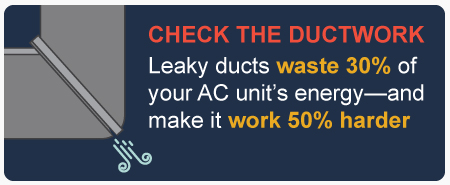 maintain a consistent airflow throughout the home. Dust that accumulates on components such as the blower’s motor fan blades, coils and ducts, can block airflow by up to 40 percent. When an HVAC unit works harder, it uses more energy. As little as 0.042 inches of dust can reduce a furnace’s efficiency by up to 21 percent.
maintain a consistent airflow throughout the home. Dust that accumulates on components such as the blower’s motor fan blades, coils and ducts, can block airflow by up to 40 percent. When an HVAC unit works harder, it uses more energy. As little as 0.042 inches of dust can reduce a furnace’s efficiency by up to 21 percent. - Extend the life of your heating and cooling system: When an HVAC system works in optimal conditions, it doesn’t exert any extra effort to perform. Conversely, when machinery has to work harder to perform a task, the parts wear prematurely, resulting in frequent repairs.
- Leak detection: When ducts have air leaks, the warm or cool air that’s supposed to go into your home may escape into places that don’t need it, like between the walls. Therefore, to maintain the comfort levels in your home, your HVAC unit has to work harder to compensate for the lost air. While performing duct cleaning, Portland contractors may also inspect the ductwork for energy wasting air leaks or splits.
- Improve the quality of indoor air: Ducts are a treasure trove of allergens. Even if you don’t suffer from allergies, the dust that accumulates may become the perfect environment for bacteria and dust mites. Other items that may lurk in ductwork include dead insects, rodent droppings, cobwebs, dead skin cells, particulates from building materials and mold spores. Learn more on how to improve your indoor air quality here.
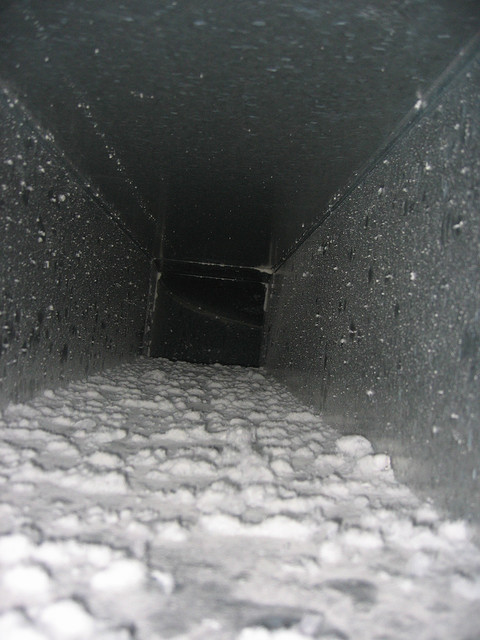
How the Pros Clean Ducts
When you hire a duct-cleaning service, make sure the company holds a certification from the National Air Duct Cleaners Association. Reputable contractors use large trucks with a mounted vacuum system that blasts compressed air at 180 pounds per square inch and sucks at a rate of 15,000 cubic feet per minute.
To complete the job, technicians prepare your home, connect a vacuum hose to your home’s air handler and the air compressor hose the ductwork. The air blasts the debris off the insides of the ducts and the vacuum sucks it into the truck. The process generally takes less than a day to complete. For more duct cleaning resources, click here.
Duct Cleaning, Portland Residents May Need it When…
- Purchasing a new home
- Musty or unpleasant odors come out of the registers
- There are dead insects, rodent droppings or mold in the ductwork
- Debris, dust bunnies or other particles blow out the registers
- Recently completed a remodeling project or some type of construction in the home
- It’s been more than five years since the last ductwork cleaning
- The HVAC unit receives regular maintenance and is in good shape, but the home seems overly dusty
- The HVAC needs frequent repairs because of dust buildup within the system
Duct cleaning is a vital maintenance service that your home and HVAC system occasionally need. While there are no studies that link a lack of duct cleaning with health problems, there is significant proof that the task can increase the efficiency and longevity of a heating and cooling system. The cost of the professional service more than makes up for itself in the energy saving that you experience and the reduced frequency of repairs. For any further questions or assistance, please don’t hesitate to contact us.